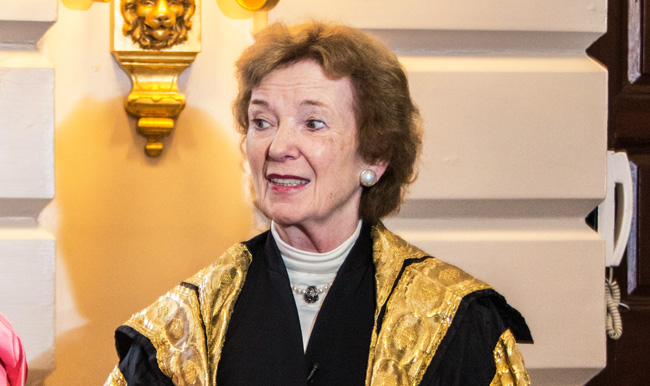Lisa Carty, Tara Flynn, Iseult Ward, Dee Forbes, Sinéad Burke and Trinity Chancellor Mary Robinson were awarded the Trinity Law Society’s (Law Soc) Praeses Elit award this week for their social, economic, cultural and political achievements.
The award recognises those who have excelled in their chosen field. The Women in Leadership panel discussion was hosted by Law Soc in an anticipative celebration of International Women’s Day next week, this year celebrating the theme “better for balance”.
Robinson began by saying that she was “so pleased” to have been asked to chair the discussion. She informed the audience that only that day a new women’s group had been launched for women with senior roles in the United Nations, including those with an understanding of multinational systems.
Robinson opened the discussion by asking the panel about the challenges they have faced by simply being a woman in their industry. Burke, an activist and teacher, jokingly remarked that she was very tenacious – something echoed by her fellow panellists later on.
Flynn, a successful comedian and writer, said that success for her was determination and staying power within your industry. Forbes, Director General of RTÉ, simply remarked that she “loves and believes in what she is doing”.
Robinson delved deeper into these issues, however, quizzing the panelists about the inequality that still exists for women. Ward, a former BESS student and entrepreneur, explained that it is difficult being young and having a lack of experience. She mused over times at the beginning of her career when she was naive, believing that she was being taken seriously when she wasn’t.
At this point, Robinson interjected to comment that it was enlightening to see the “flexing of youth power muscles” during the last two referendums, with which the rest of the panel wholeheartedly agreed. Robinson also eagerly commended today’s schoolchildren and the initiative they are showing with regard to global issues such as climate change, which are close to her heart.
Flynn was the first of the panel to bring up the Me Too movement, a topic which could hardly have gone unmentioned in such a discussion. Flynn emphasised the importance of using one’s platform for good. The comedian would often ask herself: “Now that people are listening, what are you saying?” Forbes agreed, giving the advice: “Be you, and know what you stand for.”
Kate Fahy, the Auditor of Law Soc, then put three questions to the panel that had been submitted in advance. The first was whether the members of the panel had ever felt the need to diminish any feminine aspects of themselves. Burke, a standout speaker on the panel, commented that her disability had framed the lens through which she views the world. However, without it she would not be working either in fashion or as a teacher.
Flynn gave a funny anecdote in response to the same question, describing how she was once apologetic about the contents of her newspaper column, of which she had been accused of “hating on men”. She described how she had apologised profusely, saying things like “I don’t hate men, I know loads!”.
The second was in relation to the gender pay gap, another topical issue in terms of gender equality. Carty, a partner in William Fry, emphasised that we need to continuously work on it and address it. Forbes, whose name was frequently mentioned in the media coverage surrounding the RTÉ gender pay-gap scandal, aired a concern that it could go too far.
“You need to be in a job because you’re the right person, not because you’re the only woman on the panel”, she said. Flynn rounded up the second question by commenting that of course everyone wants the job to go to the right person, but many women are.
In a fitting close to the celebratory evening, the panellists excitedly disclosed their sources of inspiration – their personal heroes. Carty asked if she could answer first, exclaiming that it was “massive” for her to be in a conversation with Mary Robinson. She described the impact Robinson has had on women all over Ireland.
Burke echoed this, quoting “If you see it, you can be it”. Robinson was humbled by the comments, reminding the panel that she was still the chair, to much laughter.







